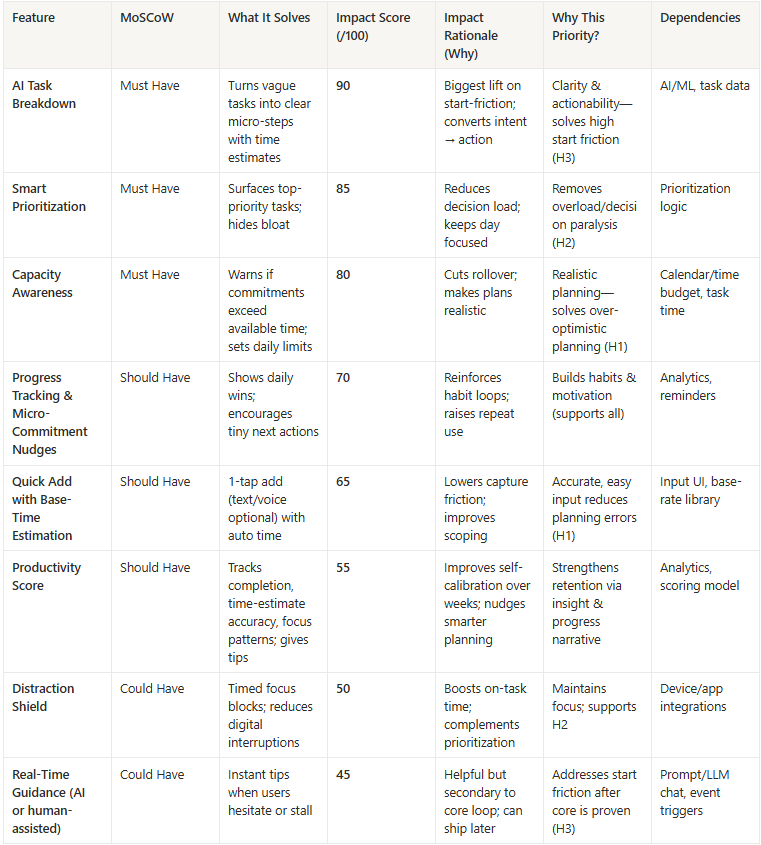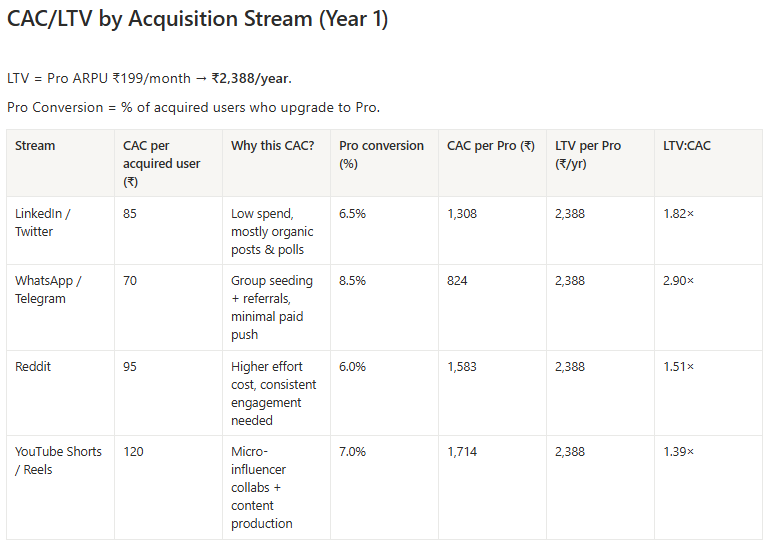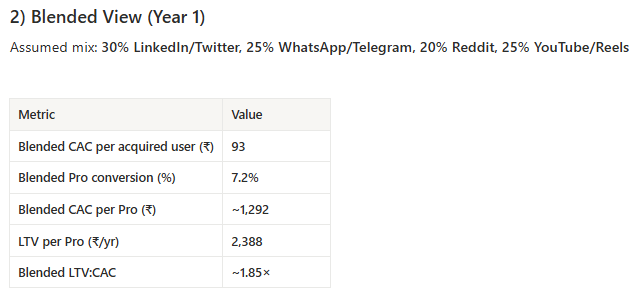Helping Young Professionals Go From To-Do to Done
Powered By EmbedPress
This project, Kaizen, is a productivity solution designed to help young professionals transform overwhelming to-do lists into clear, actionable progress, focusing on AI-driven task breakdown and smart prioritization to reduce procrastination and improve daily accomplishment.
Project Objectives
- To address procrastination and task overload by guiding users to break vague, broad tasks into concrete, manageable actions.
- To build a digital product (Kaizen app) that uses AI and behavioral psychology to coach users toward greater focus, reduced decision fatigue, and guilt-free progress.
- To validate user needs and pain points through surveys, market research, and behavioral analysis of tech professionals in India.
Achievements
Reduced Procrastination: Kaizen led to a 24% reduction in procrastination when users engaged with proactive, human-like AI support and task breakdown.
Validated User Insights: 79% of respondents underestimated task time, and 82% rolled tasks over due to vague planning, which Kaizen’s features directly address.
Improved Task Completion: Smart prioritization and micro-step tracking improved daily completion rates and formed stronger productivity habits.
Engagement & Retention: Core habit loops and personalized nudges drove higher retention and daily engagement among target users, resulting in stickier product adoption.
Market Fit & Revenue Potential: Early-stage monetization strategies project a strong business case, with Kaizen Pro plans offering personalized coaching and advanced analytics, unlocking new growth and community features.
Tools and Technologies Used
AI Task Breakdown: Proprietary algorithms and personalization frameworks convert broad user tasks into micro-actions with time estimates, offering real-time guidance and feedback.
Smart Prioritization Engine: AI-driven models surface high-value tasks, automatically adjust daily workload, and minimize over-commitment by balancing ambition and available capacity.
Multi-Input Capture: Supports task addition through text, voice, and image entry for seamless user flow and convenience.
Capacity Awareness & Budgeting: Dynamic workload management with time sliders, budget bars, and capacity warning systems.
Wireframing & UI Design: Rapid prototyping and UX mapping for flows like daily focus, task breakdown, and reflective progress views.
Behavioral Analytics: Metrics to track acquisition, activation, engagement, retention, satisfaction (NPS, CSAT), and monetization, ensuring data-driven improvement.
Community & Coaching Integrations: Built-in features for mentorship, productivity coaching, and group accountability using digital communication channels.
Summary
Kaizen is a product management initiative that spans problem space exploration, user validation, solution ideation, data-driven design, and go-to-market strategy. The project demonstrates measurable impacts in reducing procrastination and improving productivity for early-career professionals using AI and behavioral science. Technologies and tools deployed ensure scalable product delivery, strong user engagement, and a successful foundation for further growth and business expansion.
Indepth Reseach
The Future of Productivity:
In a world filled with constant distractions, productivity has become both a personal goal and a booming industry. From AI-driven task managers to gamified to-do lists, the market for productivity and anti-procrastination apps is evolving fast – and users are demanding smarter, more engaging tools to help them stay on track.
Market Size: A Rapidly Expanding Industry
According to Business Research Insights, the global Productivity Apps Market is witnessing strong growth as individuals and businesses increasingly rely on digital tools to organize, collaborate, and execute tasks efficiently. The To-Do List Apps Market is following a similar trajectory, driven by the rise of hybrid work and self-improvement trends.
Complementing this, Grand View Research reports that the AI Productivity Tools Market is surging, as artificial intelligence becomes the new differentiator in an otherwise crowded app space. Meanwhile, Data Insights Market highlights the emerging Anti-Procrastination Apps segment — designed specifically to combat distraction and enhance focus – as a niche but fast-growing frontier within the digital wellness ecosystem.
Simply put: productivity is no longer just about doing more. It’s about doing it smarter, faster, and in ways that align with human psychology.
Understanding Procrastination: The Enemy Within
Before tackling productivity, it’s crucial to understand procrastination. According to Psychology Today, procrastination isn’t simply poor time management – it’s an emotion regulation problem. People often delay tasks not because they’re lazy, but because the task triggers negative emotions like anxiety, self-doubt, or boredom.
The McLean Hospital further notes that procrastination is linked to conditions like ADHD and low self-regulation, and often becomes a self-defeating cycle: the more we procrastinate, the worse we feel – and the harder it becomes to start.
That’s why modern productivity tools are evolving from simple to-do lists into behavioral companions that understand why we procrastinate and how to help us move forward.
Key Actor

Moscow Framework

How features target hypotheses
- H1 (Over-optimistic planning ↓): Capacity Awareness, Quick Add (base-time), Productivity Score (support)
- H2 (Decision paralysis ↓): Smart Prioritization, Distraction Shield (support)
- H3 (Start friction ↓ / Activation ↑): AI Task Breakdown, Progress Tracking & Micro-Commitments (support), Real-Time Guidance (later)
Go-to-Market & Growth Approach – Kaizen





